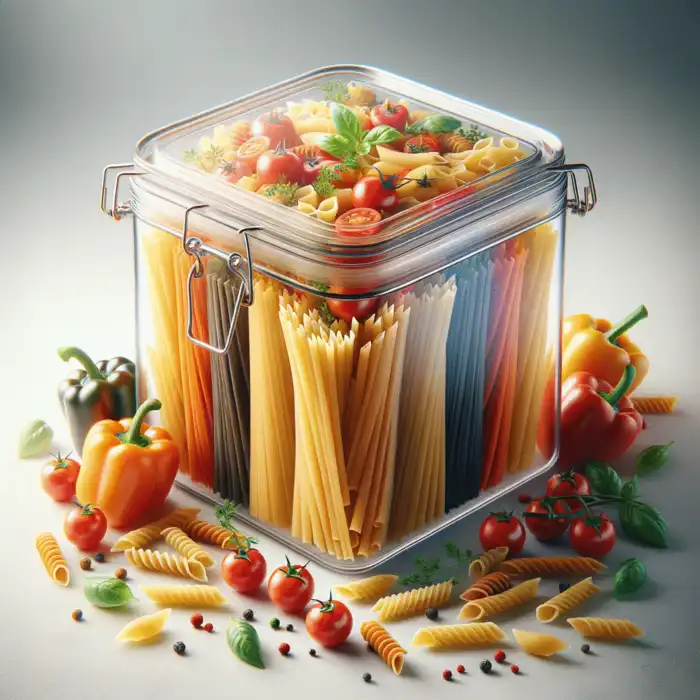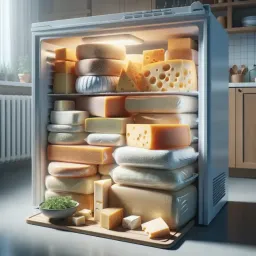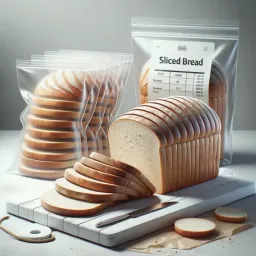Freezing Leftover Pasta Meals Tips

Posted on: 2025-05-14
By: Olivia Hartman
Are you tired of tossing out leftover pasta? Discover how freezing your meals can transform your cooking habits and reduce food waste, all while saving you time and money!
What You Will Learn
- Freezing leftover pasta can significantly reduce food waste and save money.
- Having frozen meals on hand offers convenience, making meal prep easier and reducing reliance on takeout.
- Proper cooking techniques, like cooking pasta al dente and using airtight packaging, help maintain flavor and texture during freezing.
- Freezing preserves nutritional quality, locking in vitamins and minerals while allowing for better portion control.
- Advanced techniques such as flash freezing and vacuum sealing enhance the freshness and quality of frozen meals.
- Choosing the right sauces and ingredients, like avoiding creamy sauces, can improve the outcome of frozen pasta dishes.
- Special dietary needs, such as gluten-free or vegan options, can be accommodated through thoughtful cooking and freezing methods.
Benefits of Freezing Leftover Pasta Meals
Freezing leftover pasta meals offers several advantages, including reducing food waste, saving time, and maintaining flavor and nutrition. Below is a breakdown of key benefits and techniques.
Key Benefits
- Convenience: Quick meals ready to heat.
- Cost-effective: Minimize grocery waste.
- Less stress: Easy meal planning.
Advanced Techniques
- Flash Freezing: Preserve structure by freezing in a single layer.
- Vacuum Sealing: Remove air to prevent freezer burn.
- Sauce Compatibility: Use tomato-based sauces for best results.
Understanding the Benefits of Freezing Leftover Pasta Meals
Freezing leftover pasta meals can be a game-changer for many home cooks! At Can You Freeze It?, we believe that understanding how to properly freeze food can significantly help you minimize food waste and save money. When you freeze your leftover pasta, you not only enjoy your delicious meal later, but you also contribute to a more sustainable kitchen by reducing the amount of food that ends up in the trash.
Meal planning becomes much easier when you have frozen pasta on hand. Just imagine opening your freezer and finding a homemade meal ready to go! This convenience makes it less likely you'll opt for takeout, which is often more expensive and less healthy.
Reducing Food Waste and Saving Time
By freezing leftover pasta meals, you're actively taking steps to reduce food waste. According to recent studies, a significant portion of food waste happens at home, and leftover pasta can often be one of those items that gets forgotten in the fridge!
- Convenience: Having frozen meals means you can quickly heat up lunch or dinner without the fuss of cooking from scratch.
- Cost-effective: You make the most of your grocery shopping by ensuring nothing goes to waste.
- Less stress: Freezing meals allows you to plan ahead, making weeknight dinners easier.
Freezing leftover pasta not only saves you money but also helps you manage your time better. Instead of starting from zero, you can pull out a meal and have a delicious dinner on the table in no time!
Maximizing Flavor and Texture
One of the best parts about freezing leftover pasta is how it can preserve flavor and texture when done correctly. You might be wondering, "How do I ensure my pasta maintains its deliciousness in the freezer?" Great question!
- Cook pasta al dente: This helps the pasta maintain its structure during freezing and reheating.
- Use proper packaging: Airtight containers or freezer bags can help prevent freezer burn, which can ruin the flavor.
- Consider sauces: Some sauces freeze better than others, so think about what you're pairing with your pasta!
When you freeze pasta properly, you’ll discover that it can taste just as delightful as when it was first made. Plus, it’s a fantastic way to keep those yummy flavors alive for future meals!
Exploring Nutrition and Food Quality in Frozen Pasta
Did you know that freezing can actually help preserve the nutritional quality of your pasta? At Can You Freeze It?, we focus on ensuring that you not only enjoy delicious meals but also maintain their nutritional integrity.
Freezing can help lock in vitamins and minerals, keeping your meals nutritious. Here's what you should know:
- Proteins and fibers: These nutrients typically remain intact during freezing, making your meals just as healthy later on.
- Flavors: Properly frozen pasta retains its taste, meaning you won’t sacrifice flavor for convenience.
- Portion control: Freezing meals in individual servings can help with maintaining nutritional balance, making it easier to manage portion sizes.
In the end, freezing your leftover pasta meals not only helps to keep food waste down but also ensures that you can enjoy nutritious, tasty dishes even on those busy nights! So, next time you’re contemplating whether to freeze your pasta, remember these benefits and get ready to enjoy pasta perfection!
Quick Summary
Here's a brief recap of the key points discussed so far:
- Freezing leftover pasta helps minimize food waste while saving time and money.
- Proper techniques, such as cooking pasta al dente and using airtight packaging, enhance flavor and texture retention.
- Understanding nutritional benefits ensures your meals remain healthy and satisfying even after freezing.
Frequently Asked Questions (FAQs)
- Q: Why should I freeze leftover pasta?
- A: Freezing pasta reduces food waste, saves time, and allows you to enjoy pre-made meals conveniently.
- Q: How does freezing pasta help with meal planning?
- A: Having frozen pasta meals readily available simplifies meal preparation and reduces the likelihood of opting for takeout.
- Q: What are the best techniques for freezing pasta to maintain its texture?
- A: Cook pasta al dente, use airtight containers or freezer bags to prevent freezer burn, and consider the type of sauce you’re using.
- Q: Does freezing affect the nutritional value of pasta?
- A: No, freezing helps preserve the nutritional quality of pasta by locking in vitamins and minerals.
- Q: What types of sauces are best for freezing with pasta?
- A: Tomato-based sauces generally freeze better than cream-based sauces.
- Q: Can I freeze gluten-free or vegan pasta?
- A: Yes, but cook gluten-free pasta slightly less to avoid mushiness. For vegan options, consider vegetable-based sauces for optimal freshness.
- Q: What is flash freezing and how does it help?
- A: Flash freezing involves spreading cooked pasta in a single layer on a baking sheet before freezing, which helps preserve its taste and texture.
- Q: How does vacuum sealing improve frozen pasta quality?
- A: Vacuum sealing removes air, preventing freezer burn and maintaining the freshness of your pasta meals.
Advanced Techniques for Freezing Pasta
Freezing pasta isn't just about tossing it in a bag and calling it a day! There are advanced techniques that can significantly enhance the quality and convenience of your frozen meals. At Can You Freeze It?, we believe in empowering you with the knowledge that makes meal prep easier and more efficient. Let's dive into some clever strategies to ensure your frozen pasta stays delicious and satisfying!
Addressing Special Dietary Needs in Pasta Freezing
Not everyone can enjoy regular pasta, and that's where special dietary considerations come into play. If you're freezing gluten-free or vegan pasta, here are some tips to keep in mind:
- For gluten-free pasta, cook it slightly less than al dente to avoid mushiness after thawing.
- Use sauces that are naturally gluten-free, like marinara or pesto, to ensure your meal remains safe.
- When it comes to vegan pasta, consider using vegetable-based sauces to maintain optimal flavor and freshness.
These simple adjustments can help you create tasty meals that meet various dietary needs while reducing waste. It’s all about making your kitchen work for you!
Implementing Flash Freezing and Vacuum Sealing
Ever heard of flash freezing? This technique is a game-changer for preserving the taste and texture of your pasta. Here’s how to do it:
- Spread cooked pasta in a single layer on a baking sheet.
- Place the tray in the freezer until the pasta is solid (about 1-2 hours).
- Once frozen, transfer the pasta to vacuum-sealed bags for optimal freshness.
Using vacuum sealing can help remove air, which is a major cause of freezer burn. This technique keeps your pasta meals tasting as fresh as the day you made them!
For more information on safe freezing practices, including recommended temperatures and storage times, the USDA's Food Safety and Inspection Service provides comprehensive guidelines. Following these guidelines, available at fsis.usda.gov, can help ensure that your frozen pasta meals are both delicious and safe to eat.
Incorporating Sauce Compatibility and Vegetable Additions
Not all sauces and vegetables freeze well with pasta, so making the right choices is essential. Here are some guidelines:
- Opt for tomato-based sauces, which generally freeze well and maintain flavor after thawing.
- Avoid cream-based sauces if you're planning to freeze, as they can separate upon reheating.
- For veggies, stick with frozen peas, spinach, or bell peppers, as they hold their texture nicely.
Pairing the right ingredients ensures your frozen meals are as delightful as they are convenient. Plus, you’ll have the satisfaction of knowing you’ve contributed to reducing food waste!
Using Cheese in Freezing Pasta Dishes
Cheese can be a wonderful addition to pasta dishes, but it requires a bit of finesse when freezing. Here are some tips to keep in mind:
- Choose hard cheeses like Parmesan or Asiago which freeze well and can easily be grated over dishes after reheating.
- Avoid using fresh cheeses like mozzarella or ricotta in frozen dishes, as they can become grainy.
- For sauces, consider adding cheese during the reheating process for a creamy texture.
With the right cheese choices and techniques, you can elevate your frozen pasta dishes to new delicious heights!
Final Thoughts on Freezing Leftover Pasta Meals
In conclusion, freezing leftover pasta meals can be both a smart and satisfying way to manage your kitchen. With advanced techniques at your disposal, you can create meals that not only save time but also taste great! Remember, we at Can You Freeze It? are here to support you in making the most of your groceries while reducing food waste.
Summary of Key Freezing Tips
To recap, here are the main points to keep in mind when freezing pasta:
- Cook pasta al dente for optimal freezing quality.
- Use proper cooling and portioning methods to prevent sticking.
- Implement advanced techniques like flash freezing and vacuum sealing.
- Choose sauces and cheese wisely to retain flavor and texture.
Encouraging Smart Meal Planning
Smart meal planning not only saves time but also helps you make the most of your pantry ingredients. By applying these freezing strategies, you can enjoy homemade meals on your busy days without worrying about food waste. So go ahead and embrace your newfound freezing skills—you won’t regret it!
Recap of Key Points
Here is a quick recap of the important points discussed in the article:
- Freezing leftover pasta meals helps reduce food waste and save money.
- Cook pasta al dente to maintain its structure when freezing.
- Use airtight containers or vacuum-sealed bags to prevent freezer burn.
- Consider the compatibility of sauces and vegetables for optimal flavor retention.
- Portion meals for easier reheating and better nutritional control.
- Implement advanced techniques like flash freezing for enhanced quality.
- Choose hard cheeses for freezing to maintain texture; avoid fresh cheeses.
 Did you know that freezing cheese correctly not only preserves its flavor but also helps reduce food
Did you know that freezing cheese correctly not only preserves its flavor but also helps reduce food
 Have you found yourself tossing bread into the trash because it went stale too quickly? You’re not
Have you found yourself tossing bread into the trash because it went stale too quickly? You’re not
 Did you know that the humble banana holds secrets to reducing food waste while maximizing your kitch
Did you know that the humble banana holds secrets to reducing food waste while maximizing your kitch